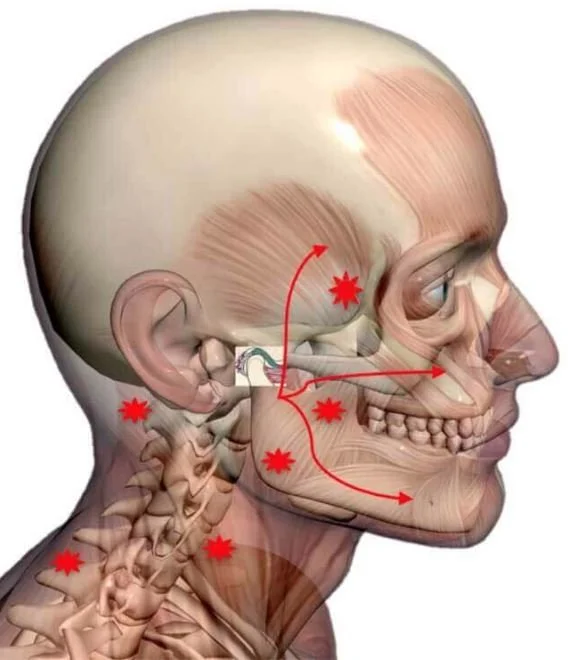TMJ Pain/Disorders
TMJ, or temporomandibular joint, is the part of the lower jaw that connects to the skull in front of each ear. TMJ disorders (TMDs) are a group of conditions that affect the TMJ and the muscles that control jaw movement, causing pain and dysfunction.
Several treatment options exist depending on the cause and severity of the symptoms. All of these options are conservative and do not produce permanent damage to the teeth.
FAQs about Temporomandibular Disorders (TMD)
What is TMD?
Temporomandibular disorders (TMD) refer to a variety of conditions affecting the temporomandibular joint (TMJ), the muscles that control jaw movement, and the surrounding tissues. These disorders can cause pain, restricted movement, and clicking or popping sounds in the jaw.
What causes TMD?
The exact cause of TMD is often unclear, but it can result from a combination of factors such as jaw injuries, arthritis, genetics, dental issues, or habits like teeth grinding and clenching.
What are the symptoms of TMD?
Common symptoms include jaw pain or tenderness, difficulty or discomfort while chewing, aching facial pain, locking of the joint, and clicking or popping sounds when opening or closing the mouth.
How is TMD diagnosed?
Diagnosis typically involves a thorough medical history review and physical examination of the jaw. In some cases, imaging tests like X-rays, MRI, or CT scans may be used to get a detailed view of the TMJ and surrounding structures.
What treatments are available for TMD?
Treatment options vary depending on the severity and cause of the disorder. They can include self-care practices (like applying ice or heat, avoiding hard foods, and practicing relaxation techniques), medications (pain relievers, anti-inflammatories, muscle relaxants), physical therapy, oral splints or mouthguards, and, in severe cases, surgical interventions.
Can TMD be prevented?
While not all cases of TMD can be prevented, you can reduce your risk by avoiding excessive jaw movements, managing stress, practicing good posture, and avoiding habits like gum chewing and teeth grinding.
How long does it take to recover from TMD?
The duration of recovery can vary widely. Some people may experience relief in a few weeks with conservative treatments, while others may have chronic symptoms that require ongoing management.
Are there any home remedies for TMD?
Yes, several home remedies can help alleviate TMD symptoms. These include applying warm compresses to the jaw, performing gentle jaw exercises, eating soft foods, avoiding extreme jaw movements, and using over-the-counter pain relievers.
When should I see a doctor for TMD?
You should see a doctor if you experience persistent jaw pain or tenderness, difficulty opening or closing your mouth, or if home remedies do not provide relief. Early diagnosis and treatment can help prevent the condition from worsening.
“An accurate diagnosis of TMD is the foundation of appropriate treatment. ”
— Garstka, et al. 2023



